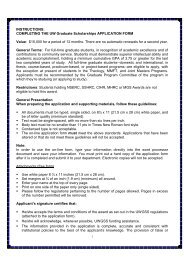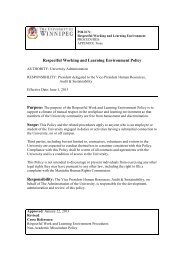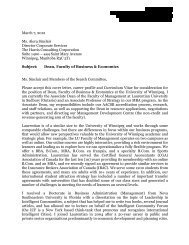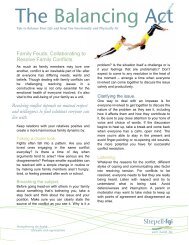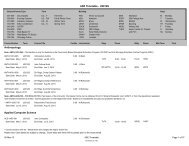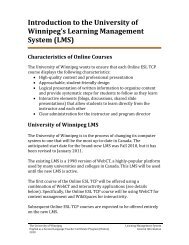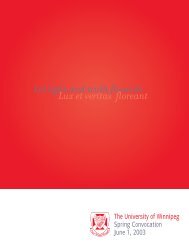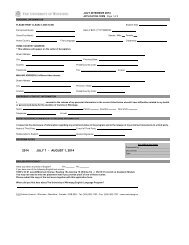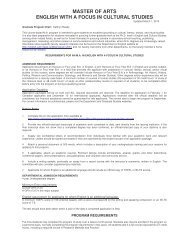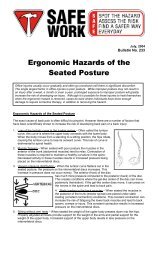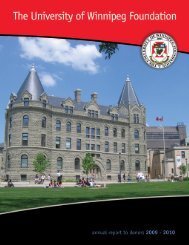Course Outline - The University Of Winnipeg
Course Outline - The University Of Winnipeg
Course Outline - The University Of Winnipeg
Create successful ePaper yourself
Turn your PDF publications into a flip-book with our unique Google optimized e-Paper software.
1Revolutionary Movements in Latin America in the 20 th centuryJosé L. RéniqueDESCRIPTIONAlthough they have exceptionally came to power, revolutionary movements have shaped thecourse of the region’s political evolution. Its analysis is therefore essential for a fullunderstanding of contemporary Latin America. Our priority in this course will be to place them inthe context of their own national history. That is, to see them essentially as a result of a particularcombination of local circumstances in interaction, of course, with broader international trends.From structural factors and global ideological influences to issues of leadership and internaldynamics will be considered in offering an understanding of their meaning and their impact.TOPICS*1. Introduction: <strong>The</strong>oretical Perspectives and Political Debates about the Problem of Revolutionin Latin America2. Anticolonial Movements Tupac Amaru, Toussaint Louverture, Hidalgo.3. Revolutionary Nationalism: Mexico, Bolivia and Peru.4. Political Radicalization in the context of the Cold War: from Guatemala to Cuba5. <strong>The</strong> Era of the Cuban Revolution: Castrismo, Guevarismo and the “continental revolution”6. <strong>The</strong> Latin American Left After the Death of Che Guevara: From Allende to the Montoneros7. <strong>The</strong> Central American Revolutionary Wars8. Counterinsurgency: the US Response to Revolutionary Challenge9. Post-Che Guerrilla Warfare: Colombia’s FARC and Peru’s Shining Path10. <strong>The</strong> Return of the Left: the Socialism of the 21 st century in Latin America• Time constraints may alter this schedule.BIBLIOGRAPHYGeneralBooks (Required reading)• Angell, Alan. “<strong>The</strong> Left in Latin America since 1930” in <strong>The</strong> Cambridge History of LatinAmerica, vol. 6, pp. 163-232.• Chasteen, John C. Born in Blood and Fire. A Concise History of Latin America, New York:WW Norton, 2009.• Castro, Daniel. Revolution and revolutionaries: guerrilla movements in Latin America,Wilmington, Del.: SR Books, 1999.• Wright, Thomas C., Latin America in the era of the Cuban Revolution, New York: Praeger,1991.Films (Strongly recommended)• CNN, Cold War: Backyard, 1954-90, http://www.youtube.com/watch?v=Q3UFsX4n3Yw• A&E, BIOGRAPHY, “Evita <strong>The</strong> Woman Behind the Myth”https://www.youtube.com/watch?v=xWIdn4v_cwc• “Guatemala - An American Genocide,” http://www.youtube.com/watch?v=qQl5MCBWtoo• PBS, “<strong>The</strong> American Experience: Fidel Castro”,http://www.youtube.com/watch?v=Z4PXtze1MU4• “Fidel - <strong>The</strong> Untold Story” by Estela Bravo (2001)http://www.youtube.com/watch?v=OkNm7BWcOl0• “<strong>The</strong> True Story of Che Guevara” by Maria Berry (2007)http://www.youtube.com/watch?v=g-ZJAS_ZzKU
2• “Che Guevara in New York, New York,” 12-16-1964 – interview.http://www.youtube.com/watch?v=qRuH_8W1bwY• “Salvador Allende, President of the Chilean people” by Patricio Guzmán ( 2004)http://www.youtube.com/watch?v=FTkY0mgvK7k• “<strong>The</strong> <strong>Of</strong>ficial Story by Luis Puenzo (1986) http://www.youtube.com/watch?v=zpnrlACx52I• “Returning <strong>The</strong> Stolen–Argentina”https://www.youtube.com/watch?v=yuBTZTi758c• “People & Power - Interrogating a torturer - 30 Sept 09”https://www.youtube.com/watch?v=uf94OjrY6Ak• “Guerrilla Girl” by Frank Piasechi Poulsen (2005)http://www.youtube.com/watch?v=2DFMHm7YEgs• “People of the Shining Path” (1992) http://www.youtube.com/watch?v=-HnH-MguElU• “Comandante” by Oliver Stone ( 2013) http://www.youtube.com/watch?v=Pan6IM-kLR4• ”<strong>The</strong> Revolution Will Not Be Televised” by Kim Bartley and Donnacha O’Briain (2003)http://www.youtube.com/watch?v=Id--ZFtjR5c• “Hugo Chavez” by Ligia Blanco (2002) http://www.youtube.com/watch?v=VCa0iKCEmno• PBS, “<strong>The</strong> Hugo Chavez Show” http://www.pbs.org/wgbh/pages/frontline/hugochavez/• “Cocalero” by Alendro Landes (2007), http://www.youtube.com/watch?v=aPELY_j7kj4• “South of the Border” by Oliver Stone (2009)http://www.youtube.com/watch?v=b0bI9KQQ_foIntroduction• Foran, John. “Discourses and Social Forces. <strong>The</strong> role of culture and cultural studies inunderstanding revolutions” in <strong>The</strong>orizing Revolutions: New Approaches from Across theDisciplines, pp. 197-220.• Goldstone, Jack A.o “<strong>The</strong>ories of Revolution: <strong>The</strong> Third Generation” in World Politics, Vol. 32, No. 3,April, 1980, pp. 425-453o“Toward a Fourth Generation of Revolutionary <strong>The</strong>ory” in Annual Review ofPolitical Science, Vol. 4, 2001, pp. 139-187, 2001.• Goodwin, Jeff and <strong>The</strong>da Skocpol. “Explaining revolutions in the contemporary ThirdWorld” in Social Revolutions in the Modern World, pp. 259-278.• Knight, Alan.o “Democratic and Revolutionary Traditions in Latin America” in Bulletin of LatinAmerican Research, vol. 20(2), pp. 147– 186.o “Social revolution: a Latin American perspective” in Bulletin of Latin AmericanResearch, 9:2, 1990, pp. 175-202.• Quijano, Anibal. “Coloniality of Power, Eurocentrism, and Latin America”http://www.unc.edu/~aescobar/wan/wanquijano.pdf• Selbin, Eric. “Revolution in the Real World. Bringing agency back in” in <strong>The</strong>orizingRevolutions: New Approaches from Across the Disciplines, pp. 119-132.• Scott, James. "Hegemony and the Peasantry” in Politics and Society 7(3), 1977, pp. 262-96.• Skocpol, <strong>The</strong>da. “”What make peasants revolutionary?” in Social Revolutions in the ModernWorld, edited by T. Skocpol, New York: Cambridge <strong>University</strong> Press, 1994, pp. 213-239.• Wolf, Eric R. "On Peasant Rebellions" in International Social Science Journal, 1969, vol.21(2), pp. 286-293.Anticolonial Movements Tupac Amaru, Toussaint Louverture, Hidalgo.• Chasteen, John C. Born in Blood and Fire. A Concise History of Latin America, chapters 1 to4.
3• Flores Galindo, Alberto. “<strong>The</strong> Rebellion of Tupac Amaru” in Daniel Castro, Revolution andrevolutionaries: guerrilla movements in Latin America, pp. 1-10.• Frantz Fanon, 1961, <strong>The</strong> Wretched of the Earth, Chapter 6. Conclusionhttp://www.marxists.org/subject/africa/fanon/conclusion.htm• Mallon, Florencia. “Indian Communities, Political Cultures, and the State in Latin America,1780-1990” in Journal of Latin American Studies, Vol. 24, 1992, pp. 35-53.• Rugeley, Terry. “<strong>The</strong> Caste War: Rural Insurgency in Nineteenth-Century Yucatan” in DanielCastro, Revolution and revolutionaries: guerrilla movements in Latin America, pp. 11-22.• Smartt Bell, Madison. Toussaint Louverture: A Biography, New York: Pantheon Books,2007, pp. 1-17.• Tutino, John. “Independence, Disintegration, and Agrarian Decompression, 1810-1880” inFrom Insurrection to Revolution in Mexico. Social Bases of Agrarian Violence 1750-1940,NJ: Princeton <strong>University</strong> Press, 1986, pp. 215-241.Populism and Revolutionary Nationalism: Mexico, Bolivia and Peru• Angell, Alan. “<strong>The</strong> Left in Latin America since 1930”, pp. 163-189.• Broué, Pierre, “Bolivia, 9 April 1952: A Forgotten ‘February Revolution’?” (April 1983)http://www.marxists.org/archive/broue/1983/04/bolivia.htm• Connif, Michael, “Introduction” in Michael L. Conniff, editor, Populism in Latin America,pp. 1-22.• Chasteen, John C. Born in Blood and Fire. A Concise History of Latin America, chapters 5 to7.• Hart, John Mason. “<strong>The</strong> Growth of the Porfirian Economy and the American Intrusion” inJ.M. Hart, Revolutionary Mexico. <strong>The</strong> Coming and Process of the Mexican Revolution,Berkeley: <strong>University</strong> of California Press, 1989, pp. 129-162.• Haya de la Torre, Víctor Raúl. “What is APRA?”• James, Daniel. "October 17th and 18th, 1945: Mass Protest, Peronism and the ArgentineWorking Class" in Journal of Social History, 21:2 (Summer 1988): 441-461.• Klein, Herbert. A Concise History of Bolivia, New York: Cambridge <strong>University</strong> Press, 201,pp. 178-238.• Knight, Alan.o “<strong>The</strong> Ideology of the Mexican Revolution, 1910-40”http://www.tau.ac.il/eial/VIII_1/knight.htmo"Populism and Neo-Populism in Latin America, Especially Mexico" in Journalof Latin American Studies 30 (1998): 223–248.• Millon, Robert P. “<strong>The</strong> Struggle of the Zapatistas” in D. Castro, Revolution andrevolutionaries: guerrilla movements in Latin America, pp. 23-42.• Ramirez, Sergio. “<strong>The</strong> Kid from Niquinohomo” in D. Castro, Revolution and revolutionaries:guerrilla movements in Latin America, pp. 43-64.• Stein, Steve. “<strong>The</strong> Paths to Populism in Peru” in M. L. Conniff, editor, Populism in LatinAmerica, pp. 110-131.• Vanden, Harry and Marc Becker, “Introduction” in José Carlos Mariátegui: An Anthology,Monthly Review Press, 2011, pp. 11-60.• Womack, Jr. John, "<strong>The</strong> Mexican Revolution, 1910-1920" in <strong>The</strong> Cambridge History of LatinAmerica, vol. 5, ed. Leslie Bethel (Cambridge, Eng., 1984), 81-153.Political Radicalization in the context of the Cold War: from Guatemala to Cuba• Anderson, Jon Lee. Che Guevara: A Revolutionary Life, New York: Grove Press, 1997, part3.• Chasteen, John C. Born in Blood and Fire. A Concise History of Latin America, chapter 8.
4• Elena. Eduardo. “Travels and Nationalism in Ernesto Guevara’s Argentina” in Paulo Drinot,editor, Che’s Travels: <strong>The</strong> Making of a Revolutionary in 1950s Latin America, Durham andLondon: Duke <strong>University</strong> Press, 2010, pp. 21-52.• Gleijeses, Piero. "Afterword: <strong>The</strong> Culture of Fear". In Nick Cullather, Secret History: <strong>The</strong>CIA's Classified Account of Its Operations in Guatemala 1952–1954 (2nd ed.). Stanford, CA:Stanford <strong>University</strong> Press, 2006, pp. xxiii–xxxviii.• Gott, Richard. “<strong>The</strong> Fall of Arbenz and the Origins of the Guerrillas” in D. Castro, Revolutionand revolutionaries: guerrilla movements in Latin America, pp. 93-103.• Handy, Jim. "<strong>The</strong> Most Precious Fruit of the Revolution": <strong>The</strong> Guatemalan Agrarian Reform,1952-54” in <strong>The</strong> Hispanic American Historical Review, Vol. 68, No. 4 (Nov., 1988), pp. 675-705.• Joseph, Gilbert. “Latin America’s Long Cold War: A Century of Revolutionary Process andUS Power” in Greg Grandin and Gilbert Joseph, editors, A Century of Revolution: Insurgentand Counterinsurgent Violence During Latin America’s Cold War, Durham and London:Duke <strong>University</strong> Press, 2010, pp. 397-412.• Zulawski, Anne. “<strong>The</strong> National Revolution and Bolivia in the 1950s: What did Che see?” inPaulo Drinot, Durham and London: Duke <strong>University</strong> Press, 2010, pp. 181-209.<strong>The</strong> Era of the Cuban Revolution: Radicalization, Castrismo and Guevarismo• Angell, Alan. “<strong>The</strong> Left in Latin America since 1930”, pp. 189-195.• Castañeda, Jorge. “<strong>The</strong> Cuban Crucible,” in Utopia Unarmed. <strong>The</strong> Latin American Left afterthe Cold War (New York: Vintage, 1993), pp. 51-89.• Castro, Fidel.o “History will Absolve me” http://www.marxists.org/history/ cuba/archive/castro/1953/10/16.htmo “On the Triumph of the Revolution” in Fidel Castro Reader (Melbourne: OceanoPress, 2007), pp. 107-136.“<strong>The</strong> Bay of Pigs Invasion and the Proclamation of the Socialist Character of theRevolution” in Ibid, pp. 189-211.• Kornbluh, Peter. “<strong>The</strong> Death of Che Guevara: Declassified”http://www.gwu.edu/~nsarchiv/NSAEBB/NSAEBB5/• Guevara, Ernesto.o“General Principles of Guerrilla Warfare” in D. Castro, Revolution andrevolutionaries: guerrilla movements in Latin America, pp. 65- 86;o `Create Two, Three, Many Vietnams'http://www.themilitant.com/1996/6036/6036_33.htmlo “Cuba: Historical exception or vanguard in the anticolonial struggle?”http://www.marxists.org/archive/guevara/1961/04/09.htm and “Message to theTricontinental” http://www.marxists.org/archive/guevara/1967/04/16.htm• Wright, Thomas C., Latin America in the era of the Cuban Revolution, pp. 1-78.<strong>The</strong> Latin American Left After the Death of Che Guevara: From Allende to theMontoneros• Angell, Alan. “<strong>The</strong> Left in Latin America since 1930”, pp. 195-209.• Allende, Salvador. “Speech to the United Nations”, December 4, 1972http://www.marxists.org/archive/allende/1972/december/04.htm• Béjar, Hector. “Some Final Notes [on a Guerrilla Experience]” in D. Castro, Revolution andrevolutionaries: guerrilla movements in Latin America, pp. 123-134.• Castro, Fidel. “Speech to the OLAS Conference”http://www.marxists.org/history/cuba/archive/castro/1967/08/10.htm
• Childs, Matt. “An Historical Critique of the Emergence and Evolution of Ernesto CheGuevara's Foco <strong>The</strong>ory,” Journal of Latin American Studies, 27, 3, 1995, pp. 593-624.• CIA, Directorate of Intelligence, “<strong>The</strong> Fall of Che Guevara and the Changing Face of theCuban Revolution”, July 18, 1965.• De la Puente, Luis. “<strong>The</strong> Revolutionary Path” in D. Castro, Revolution and revolutionaries:guerrilla movements in Latin America, pp. 113-122.• Debray, Regis. “To Free the Present from the Past” in D. Castro, Revolution andrevolutionaries: guerrilla movements in Latin America, pp. 87-91.• Gillespie, Richard. “Armed Struggle in Argentina” in New Scholar, 1982, Vol. 8 Issue 1/2,pp. 387-427.• Marighella, Carlos. “Problems and Principles of Strategy” in D. Castro, Revolution andrevolutionaries: guerrilla movements in Latin America, pp. 147-151.• Oppenheim, Lois Hecht. “<strong>The</strong> Chilean Road to Socialism Revisited” in Latin AmericanResearch Review, 1989, Vol. 24 Issue 1, p155-183.• Peredo, Inti. “Defeat in Bolivia” in D. Castro, Revolution and revolutionaries: guerrillamovements in Latin America, pp. 135-145.• Petras, James. “Questions to a Militant of the PRT-ERP” in D. Castro, Revolution andrevolutionaries: guerrilla movements in Latin America, pp. 163-170.• George Philip, <strong>The</strong> Rise and Fall of the Peruvian Military Radicals 1968-1976 (Institute ofLatin American Studies, <strong>University</strong> of London, 1978), pp. 3-12, 77-167.• Reid, Donald. “Regis Debray's Quest: From France To Bolivia And Back” in History ofEuropean Ideas. November, 1992, Vol. 14 Issue 6, pp. 839-862.• Linda Reif, “Women in Latin American Guerrilla Movements: A Comparative Perspective,”Comparative Politics, 18, 2, 1986, 147-169.• Shiraz, Zakia. “CIA Intervention in Chile and the Fall of the Allende Government in 1973” inJournal of American Studies, August, 2011, Vol. 45 Issue 3, pp. 603-613.• Torres, Camilo. “Guerrilla Pries” in D. Castro, Revolution and revolutionaries: guerrillamovements in Latin America, pp. 105-112.• Wright, Thomas C., Latin America in the era of the Cuban Revolution, pp. 61-154.Response to Revolutionary Challenge: Counterinsurgency and “Dirty Wars”• Anderson, Jon Lee. “<strong>The</strong> Dictator” in <strong>The</strong> New Yorker, October 19, 1998,http://www.newyorker.com/archive/1998/10/19/1998_10_19_044_TNY_LIBRY_000016635• Angell, Alan. “<strong>The</strong> Left in Latin America since 1930”, pp. 209-214.• Burbach, Roger. “<strong>The</strong> Atrocities of Gen. Augusto Pinochet and the US: <strong>The</strong> CondorModel”in Counterpunch, Dec 2006 http://www.counterpunch.org/burbach12112006.html• Chasteen, John C. Born in Blood and Fire. A Concise History of Latin America, chapters 9and 10.• Hatcher, Rachel. “Truth and Forgetting in Guatemala: An Examination of Memoria delSilencio and Nunca Más” in Canadian Journal of Latin American & Caribbean Studies,2009, Vol. 34 Issue 67, pp. 131-162.• McSherry, J. Patrice. “Operation Condor: Deciphering the U.S. Role”http://1933key.com/US-Terror/Operation-Condor-Deciphering-the-US-Role.• Rouquié, Alain and Stephen Suffern, “<strong>The</strong> military in Latin American politics since 1930” in<strong>The</strong> Cambridge History of Latin America, vol. 6, pp. 163-232.• Wright, Thomas C., Latin America in the era of the Cuban Revolution, pp. 155-174.<strong>The</strong> Central American Wars• Danner, Mark. “<strong>The</strong> Truth of El Mozote”http://www.markdanner.com/articles/show/the_truth_of_el_mozote• Gilbert, Dennis, Sandinistas, Cambridge, MA: Basil Blackwell, 1988.5
• McClintock, Cynthia. “Analytical Framework,” in Revolutionary Movements in LatinAmerica: El Salvador's FMLN & Peru's Shining Path (United States Institute of Peace Press,1998), chapter 1, pp. 21-43.• Palmer, Steven. “Carlos Fonseca and the Construction of Sandinismo in Nicaragua” in LatinAmerican Research Review, Vol. 23, No. 1 (1988), pp. 91-109.• Selbin, Eric. “Making the Revolution Reality: <strong>The</strong> Nicaraguan Revolution, 1979-1990,” inModern Latin American Revolutions (Westview Press, 1999), pp. 92-125.• Stahler-Sholk, Richard. “El Salvador's Negotiated Transition: From Low-Intensity Conflict toLow-Intensity Democracy” in Journal of Interamerican Studies & World Affairs, Winter1994, Vol. 36 Issue 4, p. 59.• Villalobos, Joaquín. “<strong>The</strong> Salvadorean insurgency: Why choose peace?” http://www.cr.org/accord-article/salvadorean-insurgency-why-choose-peace.• Wright, Thomas C., Latin America in the era of the Cuban Revolution, pp. 155-174.Post-Che Guerrilla Warfare: Colombia (FARC and ELN) and Peru (Shining Path)• Angell, Alan. “<strong>The</strong> Left in Latin America since 1930”, pp. 214-232.• Degregori, Carlos Iván. “How Difficult it is to be God” in Critique of Anthropology, 11, 3,1991, pp. 233-250.• Flores Galindo, Alberto. “<strong>The</strong> Boiling Point” and “<strong>The</strong> Silent War” in In Search of an Inca,pp. 197-244.• Granda, Rodrigo and Jean Batou. “<strong>The</strong> Guerrilla in Colombia” in Monthly Review: AnIndependent Socialist Magazine, March 2008, Vol. 59 Issue 10, pp. 14-32.• Starn, Orin; Carlos Iván Degregori and Robin Kirk. <strong>The</strong> Peru Reader: History, Culture andPolitics, Durham: Duke <strong>University</strong> Press, 2005, chapter VI,http://www.rci.rutgers.edu/~triner/global/PeruReader.pdf• Hough, Phillip A. “Guerrilla Insurgency as Organized Crime: Explaining the So-Called‘Political Involution’ of the Revolutionary Armed Forces of Colombia” in Politics & Society2011, vol. 39, p. 379.• Lee, Chris. “<strong>The</strong> FARC and the Colombian Left: Time for a Political Solution?” in LatinAmerican Perspectives. January 2012, Vol. 39 Issue 1, pp. 28-42.• Rochlin, James. “Sendero Luminoso: Concepts of Strategy, Security, and Power” in J.Rochlin, Vanguard Revolutionaries in Latin America, Boulder: Lynne Rienner Publishers,2003, pp. 55-86.• Rochlin, James. “<strong>The</strong> FARC and the ELN: Concepts of Strategy, Security, and Power” in J.Rochlin, Vanguard Revolutionaries in Latin America, pp. 119-170.• Rothwell, Matthew D. “<strong>The</strong> Chinese Revolution and Latin America: <strong>The</strong> Impact of GlobalCommunist Networks on Latin American Social Movements and Guerrilla Groups”http://worldhistoryconnected.press.illinois.edu/7.3/rothwell.html• Peceny, Mark. “<strong>The</strong> FARC's Best Friend: U.S. Antidrug Policies and the Deepening ofColombia's Civil War in the 1990s” in Latin American Politics & Society, Summer 2006,Vol. 48 Issue 2, pp. 95-116.<strong>The</strong> Return of the Left: the Socialism of the 21 st century in Latin America• Anderson, Jon Lee.o “Fidel’s Heir: the influence of Hugo Chavez” (June 23, 2008)http://www.newyorker.com/reporting/2008/06/23/080623fa_fact_andersono “Slumlord. What has Hugo Chávez wrought in Venezuela? (Jan 28, 2013)http://www.newyorker.com/reporting/2013/01/28/130128fa_fact_anderson?currentPage=all&pink=xSu3sT6
7o “Postscript: Hugo Chávez, 1954-2013” (Mar 5, 2013)http://www.newyorker.com/online/blogs/newsdesk/2013/03/postscript-hugo-chavez-1954-2013.html• Ellner, Steve. “Leftist Goals and the debate over Anti-Neoliberal strategy in Latin America”in Science & Society, Spring 2004, Vol. 68 Issue 1, pp. 10-32.• Harnecker, Marta; Foster, John Bellamy. “Latin American & Twenty-First CenturySocialism” in Monthly Review: An Independent Socialist Magazine, July/August 2010, Vol.62 Issue 3, pp. 3-86 http://monthlyreview.org/author/martaharnecker.• Macavoy, Stephen. “Latin America and Socialism of the 21st Century” in Socialist Action,June 28th 2011 http://venezuelanalysis.com/analysis/6307• Radu, Michael. “21 st Century Socialism in Latin America”http://www.fpri.org/enotes/200808.radu.21centurysocialismlatinamerica.html• Castañeda, Jorge G. “Latin America's Left Turn” in Foreign Affairs, May/June 2006.• Kozloff, Nikolas. Revolution! South America and the Rise of the New Left, New York:Palgrave McMillan, 2008.<strong>Course</strong> Requirements:Take-home examination: June 28, 2013.Research Paper: July 31, 2013.Both with an equal value.GRADING: 90 – 100 = A+, 85 – 89 = A, 80 – 84 = A-, 75 – 79 = B+, 70 – 74 = B,65 – 69 = C+, 56 – 64 = C, 50 – 55 = D, 49 and below FNEXUS:Nexus will function as the course website, where all information regarding the course islocated. You are already a member once registered in this class. In order to access thesite you will need to use your Web Advisor login. Log in from the UW library website toNexus, or at https://nexus.uwinnipeg.caIT IS YOUR RESPONSIBILITY TO CHECK THE WEBSITE AT LEAST WEEKLY FOR MESSAGESABOUT THE COURSE.Examinations and Papers must be submitted to the designated Drop Box on the<strong>Course</strong>’s Nexus site. <strong>The</strong> subject line must include the name under which you areregistered, the course number and the section number.All written course work must be typed.All correspondence related to course administration should be directed tor.mccormack@uwinnipeg.ca
8<strong>The</strong> <strong>University</strong> of <strong>Winnipeg</strong> has policies and rules that you are expected to know and tofollow while you are a student here. You also have rights with regard to your treatmentby the <strong>University</strong> and its faculty and staff. <strong>The</strong>se policies, rules, and rights are explainedin the Regulations and Policies section of <strong>The</strong> <strong>University</strong> of <strong>Winnipeg</strong> <strong>Course</strong> Calendarhttp://www.uwinnipeg.ca/index/calendar-calendar.One of the most important sets of rules defines and prohibits academic misconduct.<strong>The</strong>re are many forms of academic misconduct, including plagiarism. Plagiarism is thepresentation of someone else’s work as your own. This happens when you don’t showwhat information you have taken from a source (for example, by not placing quotationmarks around a direct quotation) and when you don’t use documentation correctly (forexample, citations and references). It also happens when you simply hand in someoneelse’s work as if it were your own, or when you hand in the same work to differentcourses without having the permission of the instructors to do so. When an instructorthinks a student has deliberately committed some act of academic misconduct, theinstructor will make a formal report about the incident. This report will be investigatedby both the Departmental Review Committee and the Senate Academic MisconductCommittee. If these committees agree that academic misconduct has occurred, thestudent will be penalized. <strong>The</strong> penalties range from a written warning to expulsion fromthe university. A student has the right to appeal decisions made by either committee. Ifyou are not sure how to avoid plagiarism, talk to your instructor or use any of thereference manuals available in the library, the Tutoring Centre, or on-line through the<strong>University</strong> Library’s website.<strong>The</strong> <strong>University</strong> offers free tutoring. <strong>The</strong> Computer Writing Lab (3G10- 3 rd floor ofGraham Hall) is open for your use. Hours are posted on the door. Note that theDepartment of Academic Writing offers free tutoring for students who want help on anyaspect of writing. Please speak with the supervisor in 3G10 to make an appointmentwith a tutor.Students with documented disabilities, temporary or chronic medical conditions,requiring academic accommodations for tests/exams (e.g., private space) or duringlectures/laboratories (e.g., access to volunteer note-takers) are encouraged to contactAccessibility Services (AS) at 786-9771 or email accessibilityservices@uwinnipeg.ca todiscuss appropriate options. Specific information about AS is available on-line athttp://www.uwinnipeg.ca/accessibility. All information about a student’s disability ormedical condition remains confidential.<strong>The</strong> <strong>University</strong> of <strong>Winnipeg</strong> promotes a scent-free environment. Please be respectful ofthe needs of fellow classmates and the instructor by avoiding the use of scentedproducts while attending lectures. Exposure to perfumes and other scented products(such as lotion) can trigger serious health reactions in persons with asthma, allergies,migraines or chemical sensitivities.



